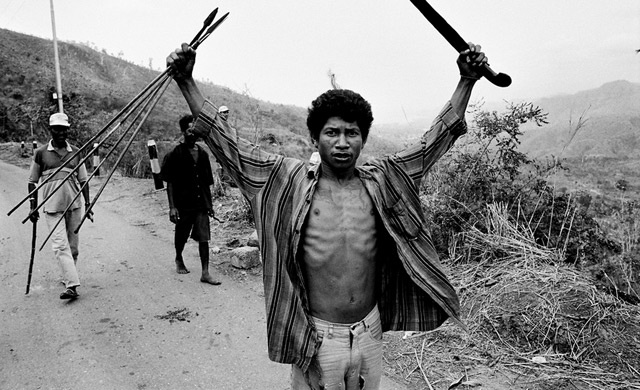
Advertisement
David Dare Parker: I've covered places in the Middle East such as Israel, Gaza and West bank. I've been to Iraq and Pakistan at the beginning of the war to train Afghan journalists; as well as Indonesia, East Timor and Thailand.What lead you to a job like this?
I was a professional musician up until I was about 25, but the years of hitchhiking and driving to gigs wore me out. I'd taken photography up as a hobby, leaning towards photojournalism after discovering the photographs of Robert Capa and Don McCullin. I decided to sell my guitars and go travelling, traveling to become a photographer.What was the first conflict you photographed?
I guess the first time I cut my teeth was covering the clashes in Gaza and West bank in '85-86.Who influences you?
Robert Capa and Don McCullin are probably the two biggest influences in my, as well as W. Eugene Smith and his work in LIFE magazine. The whole idea of building a narrative with pictures really inspired me.
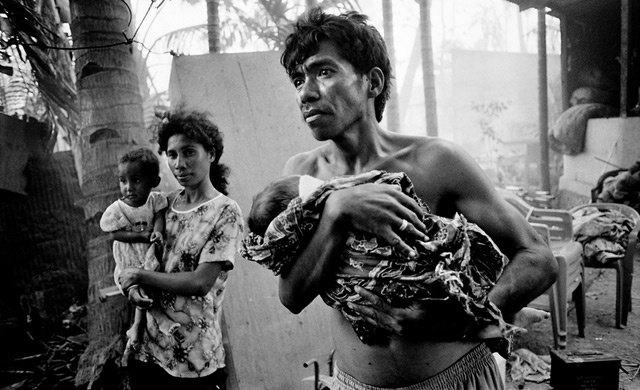
I haven't done the sort of frontline thing you would see in Saving Private Ryan. The war I've seen is a lot scrappier: people fighting with darts, bows, arrows, machetes, and occasionally AK-47's or homemade pistols and shotguns. East Timor was one horror show after another; people were picking up dead bodies in the street and carrying them to mass graves. I feel in some ways that kind of fighting is a lot more brutal because it's so in your face and close.
Advertisement
The only time I've really thought about quitting was after the tsunami (The 2004 Indonesian Boxing Day Tsunami) The thing about East Timor was you felt like you were exposing something, so you had some value to what you were doing.I followed the Red Cross in East Timor where they were finding bodies and there would be a small trench were maybe a dozen bodies at a time would be buried, or you would find some bodies in the back of a truck that had been burnt out. You were seeing some pretty horrific things. But the Tsunami was something totally different. There would be convoys of truck going past, layered with bodies, and these huge muddy pits that they would put the bodies in. I felt I had to go back after it happened though, I had people I knew there from covering the conflict between GAM and Indonesia during the Independence movement. I think that was the most disturbing thing I've seen and truthfully I don't think I did the job any justice, it felt obscene forming composition after seeing what was in front of me.It's not unusual for war correspondents to be kidnapped, seriously injured or killed while reporting on conflicts. How do you prepare yourself to enter a warzone?
No picture is worth dying for so you plan ahead. You do your research and are as prepared as you can be, finding out who the players are and what kind of weapons you might be facing. You shouldn't be there without insurance; including kidnap insurance, and a basic knowledge of first aid is essential.
Advertisement
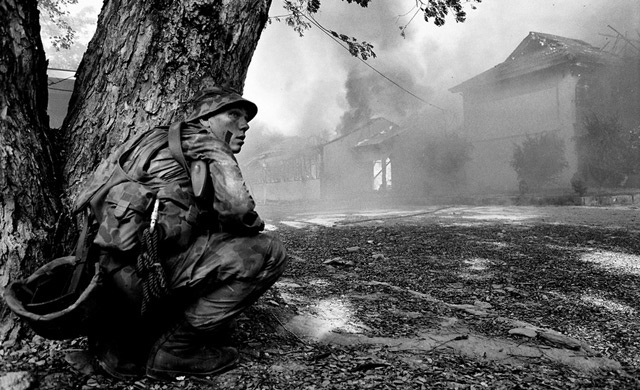
Well a lot of journalists have been taken hostage: it's big business especially in places like Iraq and Somalia. It's been happening more and more and ransom demands end up being placed on people's families, some have to resort to selling their homes to pay. You don't want that to happen to your family just because where you chose to work.Can you tell us how much are you covered for?If you go to my blog site and search "insurance" there is a post containing all the relative information and the varies companies that offer that type of insurance.What has been the scariest moment of your career?
East Timor is probably the closest I've come to being injured. Some of the Pro Jakarta militia had seen us while we were standing outside our car when they started firing at us. We threw ourselves into the backseat of the car as they were running toward us when one of them threw his gun though the back window after failing to get his last shot off; it was a homemade weapon.In Bangkok in 2010 I had two bullets that came quite close to hitting me, I didn't know how close until I ran for cover behind a burnt out vehicle as the third slammed into it. The fact is you can't do this kind of work sitting in a hotel room. You try to be as careful as you can and keep your head down.Many soldiers have experienced Post Traumatic Stress Disorder after returning home; I imagine it's similar for journalists who have also seen conflict. Have you ever struggled with PTSD yourself?
There are certain changes that occur after doing this kind of work for so many years. I don't talk to myself but I have a few unexpected twitches that appear every now and again. I think the people closest to you notice it the most.
Advertisement
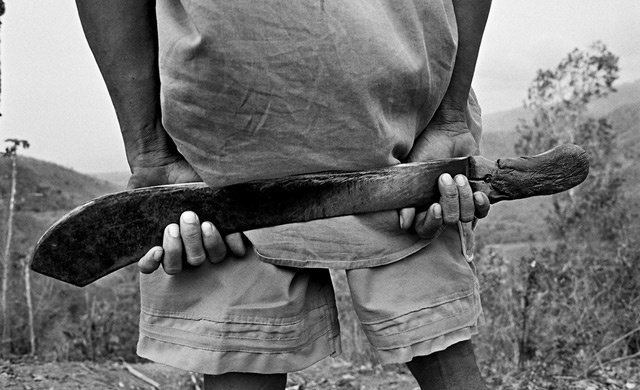
To be honest it didn't do us any disservice, it's ludicrous that one person can have that kind of power and it ended up making them look a bit silly; but it was a discussion that had to be had. We understand what we can put in front of the general public, we had already censored it in our own way. I remember one person's comments about going to see pictures of dead babies but the fact is there were none. A lot of the pictures were not confronting at all—thought provoking perhaps. I have a 7-year old-son and I wouldn't have been disturbed, I would have stood there and explained to him what he was seeing. It opened up an important discussion, a ludicrous one, but a discussion that had to be had.Your HIV Thailand story graphically showed the reality of the deadly disease. What was it like working on that project?
The difficult thing was to define why you wanted to do a story like that. It was photographed in more of a hospice than anything, it was almost like they were preparing people for death. It wasn't like what I was photographing was going to do them any good for after forming relationships with these people you would return a few days later and they would be dead. That was quite difficult. There was one woman I photographed who was also suffering from AIDS who's husband's body was on display in the next room, she asked me to take her there; I kind of fudged and didn't. They had a gallery of dead bodies on display in the front room as a way of desensitizing and bringing the attention to the effects of the disease. It was a difficult project. I think the most difficult thing was I could never quite justify what I was trying to tell with that story.
Advertisement
It is difficult. At times you go into work mode, it's like a defense mechanism I guess. I can't recall who quoted the phrase "the camera is a shield", but I don't believe that for a second. I think you have to be a humanitarian first and a photographer second to be able to do this kind of work. I don't do it just to be a photographer, I want to learn something about the world. It's hard not to connect with it if you're going to do that.You founded Degree South with some of Australia's leading photojournalists to collaborate in traveling exhibitions, books and workshops. How did this idea come about?
Part of being a photojournalist is a collaborative thing, we tend to like hanging out with each other and are all close friends. It might have been (Tim) Page and Ben Behane from memory that came up with the original concept. I was the curator of the FotoFreo festival at the time, we first launched DegreeSouth there. It was just a group of mates: Myself, Tim Page, Stephen Dupont, Jack Picone, Ben Behane, Micheal Coyne, and Ashley Gilbertson. It gave us a chance to catch up, discuss ideas such as exhibitions and books and keep us interested—it was a way to encourage and inspire one another.
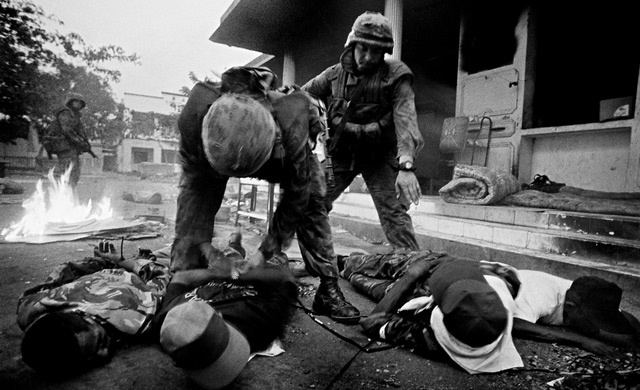
Advertisement
I still play my guitar a lot; I spend as much money on distortion pedals and fuzz boxes as I do on cameras. I have a 7-year-old son named Luc so I try and spend as much time as I can with him, watching him grow and trying to be a good dad. My partner Martine Perret and I are looking at relocating to Margret River and working on projects collectively together through our new entity. She's also a photographer and has worked in conflict zones as well. She's currently in Africa right now photographing out of helicopters, working for the UN. Aside from that I'm constantly thinking of new projects and story ideas.What are you currently working on?
I'd like to go back to Burma. I did some work there before the elections so I'd like to return. I'm still interested in doing something in the Middle East and Africa maybe. I need to get back in the field and shoot some real pictures—something gritty.If you have one piece of advice for aspiring photographers, what would it be?
Find a way to keep inspired. There's a whole world out there to report on and if this is really what you want to do you have to focus. Find ways to finance story ideas, and continue to find way to be inspired. Look at what your colleagues are doing and draw inspiration from their work. Research ideas, contact people and understand your craft. Don't get too caught up, rather than sitting on past stories sometime you're better off buying a ticket and jumping on a plane.Follow Bradley on Twitter: @HennyWilliamsFor more photography:We Talked To Giles Clarke About His Photos From HaitiKai Wierdenhöfer Hates Walls, But He Photographs Them AnywaysThere's More To Stuart Franklin Than The Most Famous Photo Of The 20th Century